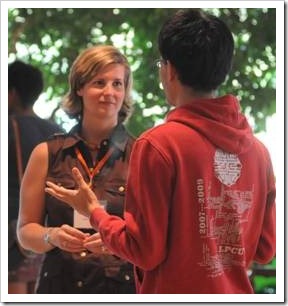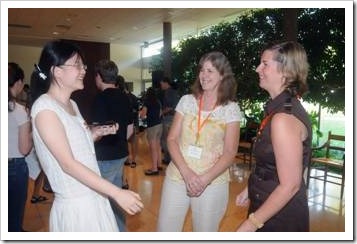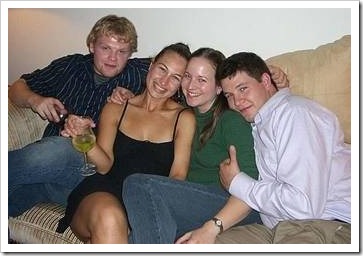
I walk around our neighborhood in the mornings and see different people. What surprises me often is how they respond when they notice me approaching. I am not too tall and quite thin, I wear normal clothes and a hat and there is nothing in my appearance that should cause anyone alarm. See for yourself on the left (not the best picture of me, but you get the idea).
Yet, some people cross to the other side of the street. They literally pick a spot well beyond contact distance and pretend they cannot see me. Other people, who might have to cross back to “my” side later to keep going, look down as they walk past me or give me a nervous forced smile, while picking up their pace.
I do not take it personally, but it makes me sad.
Men make more eye contact, their smile is more relaxed and they often greet me. Maybe they think they can handle a stranger better, if it ever came to “that” (an alternative is that only men find me attractive, but let’s not go there).
Now, I used to suffer from fear of people myself. Maybe this is why I interpret others’ behavior this way, but hopefully my suggestions today will be helpful either way.
Ronit loves to be around people. The more people, the better. She can glide into conversations, keep things moving happily and then glide out without hurting anyone’s feelings. Whenever we went to social gatherings, I felt neglected. She would mix in and I would be left feeling awkward and alone. Any conversations I managed to get involved in only strengthened my belief that people were weird and hard to deal with.
When I became a manager, my job started involving more people and less technology. When I became a consultant, my people skills became even more important. Then, I worked on my beliefs about people with my life coach and set a goal to interact better socially. Finally, when Ronit and I started Be Happy in LIFE, I had to go out and connect with people so our business could succeed.
I would like to share my secrets with you, which you can use to relax, meet wonderful people, get more business, have more fun and, very importantly, raise children who are not afraid of people and can enjoy all those things too.
Make eye contact
The eyes are the window of the soul
– Old English Proverb

Instinctively, we interpret avoiding eye contact as a form of rejection. If looking at me shows interest, not looking at me shows disinterest.
So basically, looking at the floor, at your fingernails, at your shoes, at other people’s shoes, at the food table, at the bar tender’s pouring skill or anything of that sort immediate labels you as un-contactable and disinterested in the people around you.
On the other hand, raising your eyes and looking at another person will give that person a boost of confidence and open them up to more communication.
Smile
Smile, it is the key that fits the lock of everybody’s heart
– Anthony J. D’Angelo
Most people instinctively smile back when you smile at them. This is a very good thing, because smiling is linked in our brain to being happy and both of you will be happier by smiling. When you are happy, anything you do later is going to be better.

So just think about the fact that the other person is there, likely as afraid as you are, and looking at YOU. If you smile, you are the brave one. If you smile, the other person will be thankful for your courage and will want to return the favor.
As soon as you are looking at each other and smiling, the next step should be easy.
Who is the most interesting person in the whole wide world?
If you ask anyone the above question, they would have to (secretly) admit that THEY are the most interesting to them. Specifically, they love hearing their name and how great they are.
That makes starting a conversation a lot easier than most people think. All you have to do is find something about the other person to ask about: their bright red shirt, their unusual name, their tan, their family (“Are these your kids?”), their special name tag, a comment they have just made in the conversation, etc. After that, just keep things positive.
In business networking events, carrying on a social conversation can be difficult, because everyone, including us, is there to get more business. Asking others about their life, their views and their business seems like a waste of time to many people.

If you try to push your products or information on someone, they will run away, but if you show interest in them first, they will invite you to share the same information with them, because you have made them feel good. You just need to be patient and have faith in people.
Personal space is overrated
I believe that one of the major reasons people avoid contact with others is that their parents raised them to be considerate using fear as motivation. They say, “Excuse me”, when they pass next to another person at the supermarket, they always move out of others’ way first and they never ever interrupt.
The problem is that besides these behaviors, kids also learn they are not as valuable or worthy as other people are. If shopping at a public place requires an apology, if I always need to make way to others and if I need others to decide when it is my turn to speak, then I am not worth as much as other people. Maybe I am even worthless.
Of course, my parents are good, right? So who is to blame for my feeling of worthlessness? Those other horrible people who keep shopping at the same aisles, passing me in narrow places and talking and talking and talking. These people are so horrible, I want nothing to do with them.

Being friendly on the street, dealing with one other person and social mingling are different things and there are other things that may affect your outcomes, such as you communication styles and love languages. For example, visual people do better in a crowd, because they can handle the auditory overload better, while digital people do better when there is something useful to discuss, but by feeling comfortable in the presence of other human beings, everybody does better.
So check your beliefs about other people, check how you behave towards people you do not know and when you meet new people, imagine there is a frightened little child inside them, pulling their strings. Then, look at that child, smile at him or her and help them come out to play … with your frightened inner child.
Social skills for children
As parents, we can talk to our kids about the importance of social skills until we are blue in the face. What we do matters a lot more. It is hard to convince someone to do something you obviously struggle to do yourself.
If you are afraid of strangers, your kids will most likely be too. If you smile a lot, your kids will most likely smile a lot too. Your call.
Make eye contact,
Gal











